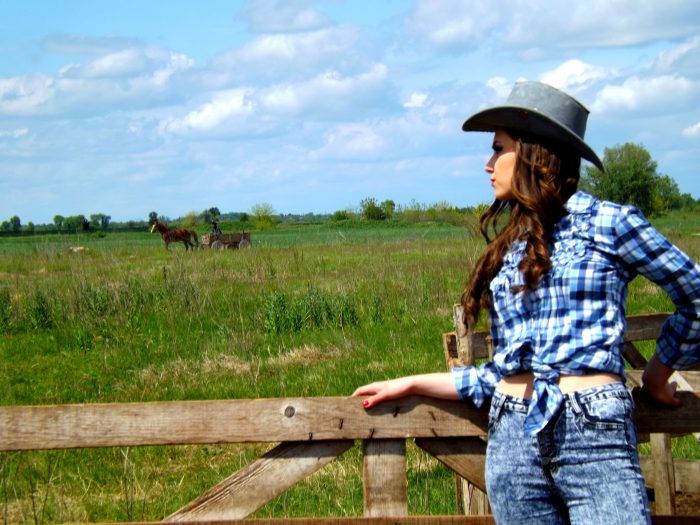I was once asked on a date in New York City why I was “raised like a boy.”
I grew up on a farm. Nobody ever made a single comment to my face about my physical appearance in those years. For in our village of 600, contribution to the family and community was what mattered.
These days, I’m a single urban woman who is told I’m beautiful every day. Almost no one comments on my contribution to my community, or on my parenting—and it’s not because I am bad at these things.
The wisdom of how to behave as a woman is subtly, but pervasively, passed down as we observe our mothers, grandmothers, aunts, and cousins in their houses and kitchens and bathrooms. I was trained to be a woman on a farm in Canada, and I had to re-train myself how to be a woman in New York City. I had to gather new wisdom, this time from my girlfriends and coworkers.
In this grown-up life, I’m given instructions from other females based on what a gentleman should “obviously” do—things like sending me a text to ask if I got home safely, for he is one step short of a brute if he does not.
This behaviour may seem like common sense to the advice-giver, but to me it can be like interpreting a foreign language. In my childhood, the only reason a man would contact someone after they left his side is if he were not safe himself.
It’s oft told to me in these conversational exchanges that some of these actions are “in our DNA,” or that we must lean back to succeed as proper females, meaning our words to men ought to be laced with emotion rather than accomplishments—or that the man, not the woman, ought to initiate contact and organize things. According to this cultural narrative, men are wired to pursue.
This version of being in my feminine was not the one I learned in my youth: the women of my childhood did most of the initiation, most of the organization, and we all darn well knew who had accomplished what.
Having grown up in one culture of femininity, and then having had the subsequent experience of moving to six different urban centers in two different countries, the true wisdom I’ve gathered is based on the fact that what’s expected of me in order to be a “good woman” no longer translates to my ears as being in our DNA, but instead to a culture of monitoring the women in our circle of influence.
Things that may seen obvious about our gender norms or behavioural standards are much more born of culture than they are of genetics.
As we witness how women behave and what is expected of us, we mirror what the generations before did to be socially acceptable, to fit in, to be chosen, to be successful, to be appealing, to be accomplished, to be a culturally valuable as a good woman.
Likewise, as in my experience, what may seem to be common sense or decency in one environment can be 100 percent decidedly different in the other. And while I’ve read plenty in the female educational dating canon to suggest otherwise, I struggle to believe it because I’ve personally lived in two diametrically opposed cultures when it comes to femininity.
The criteria of what is “common sense femininity” on a farm in a town of 600 people, three hours away from an urban centre, is simply not the same as it is in Greenwich Village.
In my childhood, we had one hairdresser to choose from—and all the ladies in town had the same kind of short permed hair. Everyone was okay with that.
It was a three-hour trip “to the city” to buy clothes. I had school clothes, work clothes, and one single designer sweatshirt that I earned by mowing literal acres of lawn and weeding seemingly equivalent acres of potatoes.
At 17, I moved to the city to start college. I recall feeling confused when men started calling me pretty. I didn’t see what that had to do with anything.
Conversely, over the last two decades, I learned what urban culture expects from a woman.
I found my place in fashion, so literally that it became my professional career for a decade. The women were glamorous and gorgeous, wearing in-season designer labels from Italy. Following these cues, I had my first manicure and pedicure. I grew my hair long and bought myself lingerie. I acquired a rack full of essential day-to-night dresses.
I currently wear 2.2 pounds of jewelry, which I know because I weighed it once.
However, on my path to being cultured as an urban girl, there are still things I find confusing, especially when they are told to me as fact and not opinion:
I have been told that woman are “intuitive,” yet I am still not sure what that means. My dad would have never told me to go to the shop and find whatever tool “felt best.” Following my gut was not valued, and potentially dangerous in this case.
Language can also be triggering for me, as I often fail to comprehend sentences littered with yoga-inspired urban feminine phrases like “creating space” or “follow your gut.”
I have no idea what either of these mean, as I relate more to concepts that are literal and grounded like, “when are you available to get together?” or “I had a good time tonight, do you want to do this again?”
As an adult, I can’t comprehend dating phrases shared from woman-to-woman like, “women are the prize.”
The “prize” women of my childhood volunteered at every community potluck and made extra meals for funerals. My mom was among them and I can’t—to this day—translate her prize status to a lifeless gem in a jewelry box, or understand how being viewed as such is valued because of what it will “get” us. I bought my own jewelry and gems.
I have also heard dating advice that tells me, “men love to help,” or “it’s in men’s DNA to hunt.” In my childhood, I observed the matriarchy doing the helping and while the men did indeed hunt deer, they did not hunt women.
I struggle with the idea that women need to “let” men do things. I buy myself flowers every week as an adult, but it has never occurred to me to deprive myself of something I want in order to let a man to do it for me—as I’ve been advised in some dating circles.
I, especially, don’t like hearing that I need to “lean back” in order to be successful as a woman. Female competence is highly prized on a farm, and I can’t comprehend why this is not the case everywhere.
To this day, I place no value on what a stranger thinks of my appearance. I shared this with a shocked 40-something-year-old man on Tinder. Not surprisingly, we didn’t go on a date.
I’m feminine, soft, and cuddly. In the dating canon’s concept of “being in your feminine,” I am. Yet my farm-raised roots mean I approach life with a ration, competence, and practicality that I rarely see the mainstream cultural narrative provide women—not to the extent that I received it, anyway.
And even though the farm culture of leaning so far in caused me to fumble and get trucks stuck in the mud, I’ve created my own version of what it is to be a good woman.


 Share on bsky
Share on bsky





Read 20 comments and reply